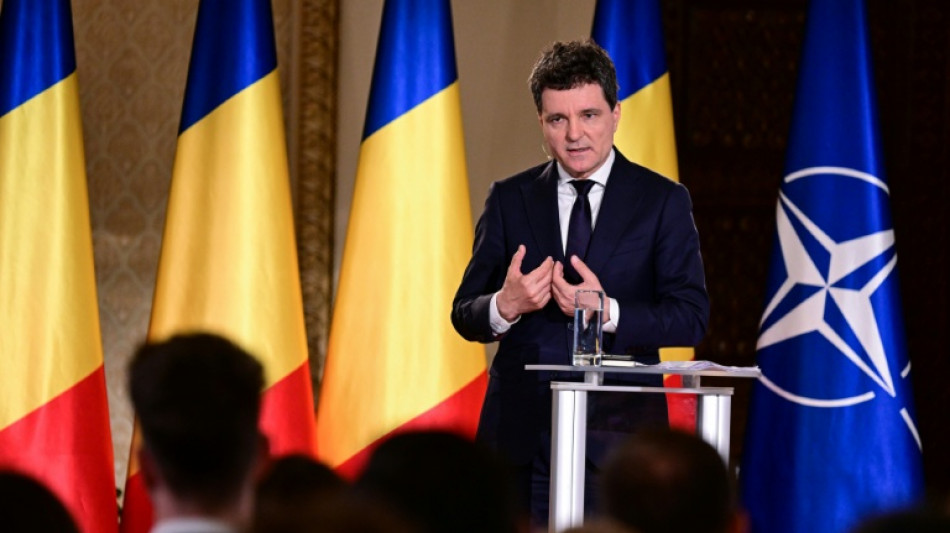

Romania's pro-EU presidential candidate hit by disinformation campaign
Fabricated documents, deepfakes and unsubstantiated claims: Romania's pro-European presidential candidate Nicusor Dan has been targeted by an online disinformation campaign that has intensified ahead of Sunday's run-off, analysts interviewed by AFP said.
According to Roxana Radu, an associate professor at the University of Oxford, the attacks against Bucharest's centrist mayor are systematic and deliberate.
"This is neither spontaneous nor new: it bears the hallmarks of a coordinated campaign, with content seeded and spread across platforms, gaining traction through bot networks," she said.
It comes after far-right candidate Calin Georgescu unexpectedly topped last year's presidential vote following a massive TikTok campaign. That election was annulled over claims of Russian interference.
Authorities have been on high alert ever since. Ahead of the presidential election's first round rerun on May 4, they warned of "new attempts at manipulation and interference by state actors".
So far, officials have not responded to AFP's request for comment.
Facebook and TikTok each have some nine million user accounts in Romania, which has a population of 19 million.
Both platforms say they are in close contact with the Romanian authorities and have deployed teams for the elections.
Nicusor Dan, a 55-year-old mathematician, faces far-right candidate George Simion, 38, in Sunday's vote.
Here are the main misleading claims being circulated about him.
- Forged diploma -
A fabricated image of Dan's high school diploma being circulated online falsely suggests he achieved mediocre grades in every subject except mathematics.
Shared thousands of times on Facebook, TikTok and X, the forged diploma prompted a deluge of disparaging comments.
However, following closer examination, AFP found that the document contained clear inconsistencies and spelling errors.
Dan, who holds a PhD in mathematics, responded to what he called "gross fake news" by presenting his real diploma during a recent televised debate.
- 'LGBTQ propaganda' -
An edited clip from Dan's meeting with the Romanian diaspora in Madrid in April falsely suggested he supported adding "LGBTQ propaganda" to school curriculums.
The false claim was amplified by far-right lawmaker Gianina Serban, who accused Dan on Facebook of supporting "the perversion of our children from the earliest age".
Posting the unedited footage on his socials, Dan could be seen emphasising that sex education should be introduced "at an age that is appropriate for the dangers children are exposed to".
Dan has been criticised for not taking a clear stance on LGBTQ issues, as the community faces hostility in Romania, where the powerful Orthodox Church wields its influence.
- Personal attacks -
Dan, who is unmarried, has long faced smears about his private life, including that his children were not baptised, which he and his partner Mirabela Gradinaru have publicly denied.
His reserved nature has been regularly mocked in video montages and elaborate AI-generated deepfakes.
Dan is also often portrayed as suffering from autism, a claim echoed by his rival Simion, who claimed "he's autistic, poor thing".
Madalina Botan, senior lecturer at Bucharest's National University of Political Studies and Public Administration, said such narratives had been observed in other European elections.
They are "designed to dehumanise the candidate, turning them into an untrustworthy figure", she said.
- Algorithms favouring the far right -
Simion, meanwhile, has been bolstered by social media algorithms that promote his emotive and often incendiary messages, experts say.
Under investigation by the European Commission, TikTok said in March that it had removed more than 27,000 fake accounts that promoted the far right in the presidential race.
But an investigation by rights monitor Global Witness published this week found that TikTok's algorithm served "nearly three times as much far-right content" to new users as all other political content ahead of Sunday's run-off.
The report warned this could "compromise the integrity of yet another election", accusing TikTok of failing to take "sufficient action".
Another study by UK-based tech company Refute found more than 32,000 inauthentic videos.
It said many of them were duplicated or AI-generated, promoting Simion and Georgescu, in what it deemed was a coordinated influence campaign targeting Romania's expatriate voters.
D.Mehra--MT



